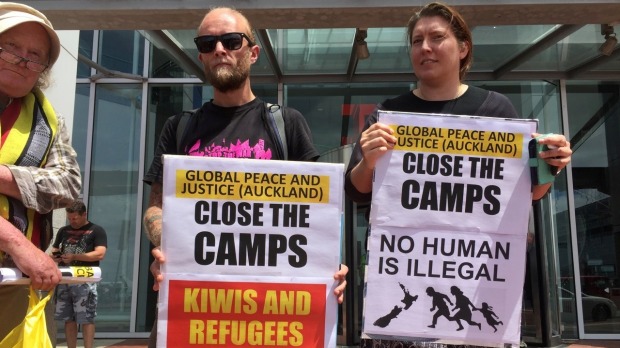While the architect of Australiaâs detention system Liberal Senator Jim Molan was rehearsing his lines to promote this cruel system on ABCâs Q&A, a woman was arrested for the crime of standing outside and peacefully holding a banner reading âClose the Camps, Bring Them Hereâ.
mandatory detention
The Manus Island tragedy is the latest in a series of systemic human rights abuses by successive Australian governments in recent decades.
But there is another story: one of courageous resistance in some of the most hostile situations imaginable â a resistance led by several hundred people on Manus Island who are still protesting, still demanding âfreedom, nothing less than freedomâ.
Chauka, Please Tell Us the Time
Written & directed by Arash Kamali Sarvestani &
Ìę
Chauka, Please Tell Us the Time is a ground-breaking film that gives audiences a new window to look into Manus Island detention centre.
Australiaâs refugee policy over the past 25 years has resulted in a detention process best described as âHell on Earthâ.
Mandatory detention was first introduced in May 1992 by the Labor government with the support of the opposition and has been marked with increasing human rights abuses including deliberate medical negligence, sexual assault by guards, self-immolation and murder.
It suffocates peopleâs hope, as many people have been in detention for more than four years with no certainty of ever being released.
As the people on Manus Island prepared to see in the New Year, drunken immigration officials and police beat up asylum seekers who were then taken into police custody and denied food and medical treatment. PNG politician Ronny Knight responded by tweeting âThey deserved what they gotâ.
Barely a week earlier Faysal Ishak Ahmed, a Somali asylum seeker in Manus Island detention centre, died on Christmas Eve after months of being denied adequate medical treatment.
Celebrations of multiculturalism happened in 26 cities and rural locations across Australia on October 22 as part of Welcome to Australia events organised under the theme of âWalking together to welcome refugeesâ.
In Sydney, helium balloons, musical performances, bright red shirts and smiles gave it a carnival like atmosphere. For some it would have been their first refugee rights event.
 Protesters outside the Australian consulate in Auckland.
Protesters in Auckland have stormed the Australian consulate on November 11 in protest at Australia's treatment of asylum seekers in prison camps, as well as the detention at Christmas Island of New Zealand citizens.
The protest, backed by trade union Unite and Global Peace and Justice Auckland, comes amid an uprising by Christmas Island detainees in the aftermath of the death of Iranian Kurdish refugee Fazel Chegeni.
Protesters outside the Australian consulate in Auckland.
Protesters in Auckland have stormed the Australian consulate on November 11 in protest at Australia's treatment of asylum seekers in prison camps, as well as the detention at Christmas Island of New Zealand citizens.
The protest, backed by trade union Unite and Global Peace and Justice Auckland, comes amid an uprising by Christmas Island detainees in the aftermath of the death of Iranian Kurdish refugee Fazel Chegeni.
The Darwin Asylum Seeker Support and Advocacy Network released the statement below on April 30, in response to apparent plans to move children and women to high-security detention centres in Australiaâs north and north-west.
- Previous page
- Page 2
- Next page










